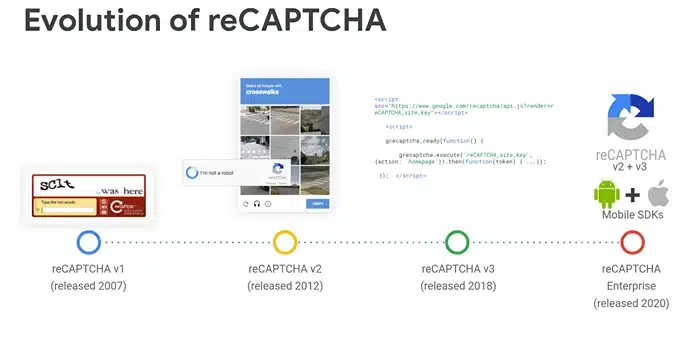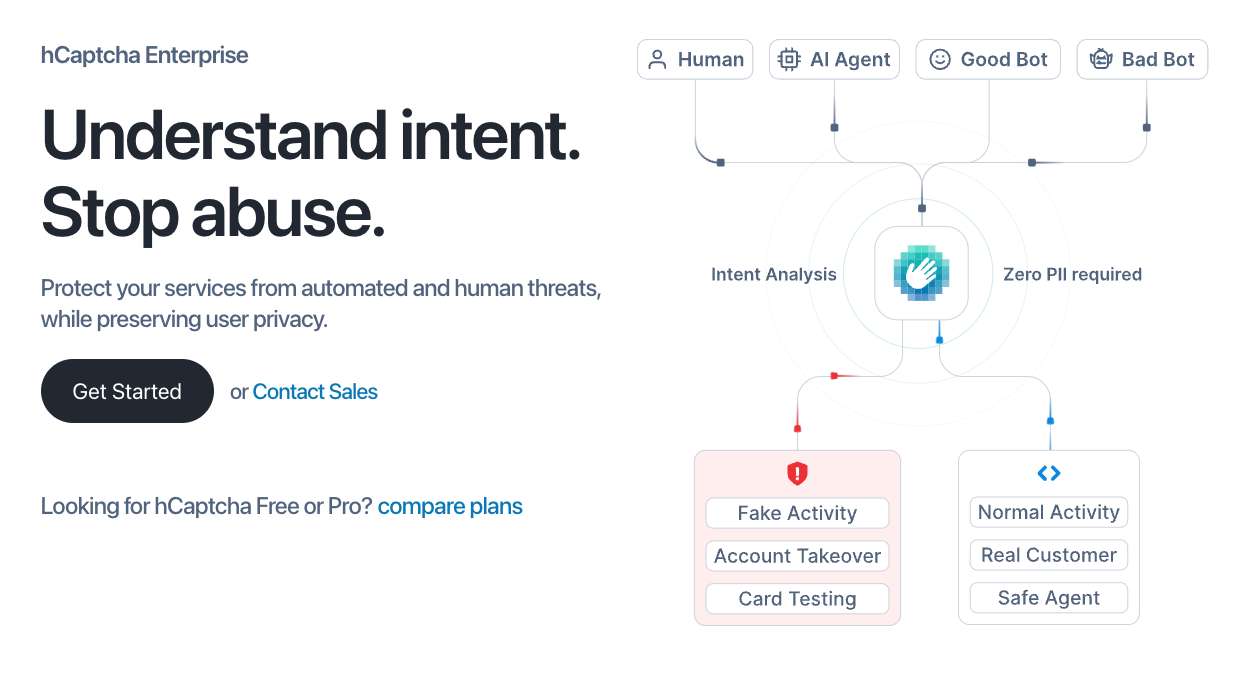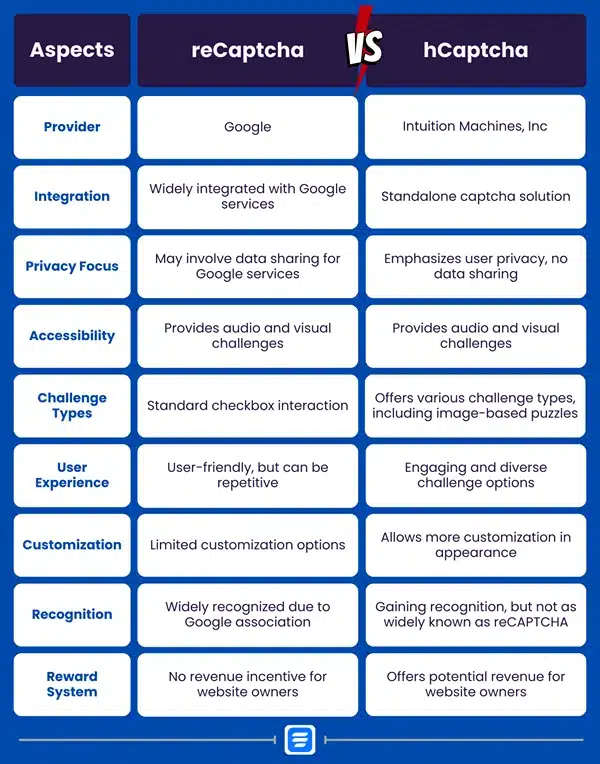10/27/2025. Choosing between hCaptcha and reCAPTCHA isn't as straightforward as it used to be, especially after Google's 2025 pricing changes caught everyone off guard. Both solutions have their strengths, but they also share the same fundamental limitation: they still interrupt your users with challenges that hurt conversion rates. The good news is that the bot protection industry is evolving beyond traditional CAPTCHAs, with new approaches like
behavioral biometrics offering invisible protection that actually works better than challenge-response systems.
TLDR:
- reCAPTCHA's 2025 pricing changes cut their free tier from 1M to 10K monthly assessments with $8 fees
- hCaptcha offers 100K free monthly requests and stronger privacy compliance than reCAPTCHA
- Both solutions achieve 69% or lower bot detection rates against sophisticated attacks
- Traditional CAPTCHAs create user friction that reduces conversion rates and revenue
Google reCAPTCHA Overview
Google reCAPTCHA has dominated the bot protection space for over a decade, evolving from simple image-based challenges to sophisticated risk analysis systems. The service protects millions of websites worldwide, making it the de facto standard for CAPTCHA solutions.
However, 2025 brought major changes that caught many developers off guard. Google transitioned reCAPTCHA management to Google Cloud, dramatically altering the pricing structure. The no-cost allowance dropped from 1 million to 10,000 assessments per month, with standard tier users now facing a flat reCAPTCHA Enterprise $8 monthly fee.
Beyond cost concerns, performance questions persist. For example, various studies have shown that
reCAPTCHA v2 has been defeated by advanced object-detection bots with an 83% success rate.
hCAPTCHA Overview
hCaptcha appeared on the scene as the privacy-focused challenger to Google's dominance, building its reputation on a fundamentally different approach to bot protection. Unlike reCAPTCHA's data collection model, hCaptcha positions itself as the solution that respects user privacy while delivering enterprise-grade security.
While Google uses CAPTCHA data to improve its AI systems, hCaptcha operates on a privacy-first model that doesn't harvest user information for secondary purposes. This approach has attracted major customers, including Shopify, and other category leaders who value user trust.
hCaptcha's technical performance stands out in the crowded bot protection space. According to their documentation, for its passive/invisible mode, hCaptcha
challenges less than 0.1% of legitimate users while maintaining high accuracy rates. This low friction rate solves one of the biggest complaints about traditional CAPTCHA systems.
The revenue model also differs substantially from competitors. Instead of monetizing user data, hCaptcha generates income through its enterprise services and machine learning training partnerships, creating much better alignment between hCaptcha's business interests and user privacy.
For developers looking at alternatives, hCaptcha offers familiar integration patterns with enhanced privacy guarantees.
ReCAPTCHA and hCaptcha: Side-by-Side Comparison
How do reCAPTCHA and hCaptcha compare? The image below provides a side-by-side on a number of different aspects.
But a feature-by-feature comparison will show you what you probably already have guessed: many CAPTCHA solutions will be relatively similar. As you consider CAPTCHA alternatives, there are three key categories to look at more deeply:
- Privacy and compliance
- Performance and accuracy
- Migration and implementation
Continuous Authentication vs Discrete Verification
Privacy compliance is the biggest differentiator between reCAPTCHA and hCaptcha, with legal implications that extend far beyond technical implementation decisions.
Google's data collection practices have drawn scrutiny from privacy authorities worldwide. The
French data protection authority ruled that reCAPTCHA uses excessive personal data for purposes other than security. And they have cause for concern. The scope of Google's data harvesting is extensive. reCAPTCHA collects previously visited websites, browsing history and interactions across the web. This data feeds Google's advertising ecosystem, creating secondary use cases that complicate GDPR compliance.
Given this, reCAPTCHA faces availability limitations in certain jurisdictions. hCaptcha, on the other hand, maintains global accessibility without geographic constraints. As the company doesn't sell ads, it has no use for user information beyond providing security services. This privacy-first model eliminates many compliance headaches for industries with strict oversight.
Privacy-First Human Verification
Bot detection accuracy reveals the fundamental limitations of traditional CAPTCHA approaches when facing sophisticated automated attacks. Real-world testing exposes major performance gaps that directly impact security effectiveness.
According to a study by the Merchant Risk Council,
AI bots can bypass reCAPTCHA with 99.8% accuracy. And even when bots aren't affective, there are entire "CAPTCHA farms" that use human labor to bypass CAPTCHA which would affect both reCAPTCHA and hCaptcha implementations.
False positive rates create equally important considerations. Both solutions occasionally challenge legitimate users, with reCAPTCHA's invisible v3 mode sometimes falling back to visual challenges when confidence scores drop. hCaptcha maintains lower false positive rates but still relies on challenge-response mechanisms.
The performance gap becomes critical for high-stakes applications. Financial services and e-commerce sites cannot afford the high miss rate that allows sophisticated bots through traditional CAPTCHA systems. Nor can those applications deal with latency in the experience caused by the CAPTCHA experience, sometimes adding a
full half-second lag to a site's load time.
Migration and Implementation
Migrating between CAPTCHA solutions involves more complexity than most developers anticipate, with technical considerations that extend beyond simple API swaps and integration updates. The migration process touches multiple parts of your stack from validation logic to user experience, and requires careful planning to avoid security lapses.
The simplest path is switching from reCAPTCHA to hCaptcha, since their APIs are largely compatible. Many organizations complete the transition with only minor code adjustments. Of course, technical implementation varies by solution complexity. While simple website integrations take hours, complex applications with custom validation logic may require days of development work and test.
Both solutions support popular frameworks including React, Angular, and Vue.js. Before deploying, teams should carefully plan testing phases to avoid security gaps. Use traffic splitting and sandbox environments for gradual rollout and safe testing.
Alternative Solutions
The CAPTCHA world extends beyond the reCAPTCHA-hCaptcha duopoly, with new solutions tackling specific use cases and technical requirements that traditional providers struggle to meet effectively.
Cloudflare Turnstile, for example, represents the most notable third alternative, offering invisible protection with generous pricing. The service provides free access for up to 1 million requests monthly, making it attractive for cost-conscious organizations. However, performance testing reveals limitations, with Turnstile achieving only 33% bot detection accuracy against sophisticated attacks.
Friendly Captcha takes a proof-of-work approach, requiring browsers to solve computational puzzles instead of visual challenges. This method appeals to privacy-focused organizations but creates battery drain concerns on mobile devices.
| Solution |
Type |
Best For |
| Cloudflare Turnstile |
Invisible |
Simple integration |
| Friendly Captcha |
Proof-of-work |
Privacy compliance |
| Roundtable |
Behavioral biometrics |
Advanced accuracy |
The behavioral biometrics category represents the next evolution in bot protection.
Roundtable's Proof of Human approach analyzes continuous user interactions to distinguish humans from bots without any challenges. For organizations reviewing alternatives, consider your specific requirements. High-traffic sites benefit from Turnstile's generous free tier, while security-critical applications require the advanced accuracy of Roundtable's
behavioral analysis solution.
Roundtable: Next-Generation Bot Protection
Traditional CAPTCHA solutions force a false choice between security and user experience. Roundtable eliminates this tradeoff entirely through behavioral biometric analysis that runs completely invisibly while delivering
87% bot detection accuracy against sophisticated attacks.
Our Proof-of-Human technology represents a fundamental shift from challenge-response mechanisms to continuous behavioral analysis. Instead of interrupting users with puzzles, Roundtable monitors subtle interaction patterns like keystroke dynamics, mouse movements, and scrolling behavior that reveal the cognitive signatures unique to human users.
The accuracy advantage is substantial. Roundtable's behavioral approach consistently outperforms traditional solutions by analyzing the full range of user interactions instead of relying on single-point challenges that bots increasingly defeat. The invisible operation means legitimate users never encounter friction, eliminating the conversion rate drops and user abandonment that plague traditional CAPTCHA implementations.
Implementing Roundtable also requires minimal engineering effort. Our one-line API integrates in minutes without complex configuration or ongoing maintenance. Unlike traditional solutions that require fallback mechanisms and challenge tuning, Roundtable works silently in the background.
And finally, since we collect no personally identifiable information, focusing exclusively on behavioral patterns instead, we're fully compliant with the strictest regulatory requirements, so you never have to worry about compliance or geographic constraints.
FAQ
What happens to my existing reCAPTCHA integration after the 2025 pricing changes?
Your current reCAPTCHA integration continues working without code changes, but you'll face charges when exceeding 10,000 monthly assessments. The standard tier now costs $8 monthly for 10,000-100,000 assessments, making migration planning important for cost management.
How do I migrate from reCAPTCHA to hCaptcha?
Most migrations require only updating site keys and endpoint URLs since hCaptcha provides compatible APIs. Simple website integrations take hours, while complex applications may need days of development work, but hCaptcha has helped many large companies rapidly migrate with minimal code changes.
Why do privacy regulations favor hCaptcha over reCAPTCHA?
hCaptcha doesn't collect browsing history or sell ads, focusing only on security services, while reCAPTCHA harvests extensive user data for Google's advertising ecosystem. The French data protection authority ruled that reCAPTCHA uses excessive personal data, making GDPR compliance much simpler with hCaptcha's minimal data collection approach.
When should I consider alternatives to traditional CAPTCHA solutions?
If you're experiencing user abandonment from CAPTCHA friction, need higher detection rates, or require complete privacy compliance, next-generation solutions like behavioral biometrics from Roundtable are the way to go. Traditional CAPTCHAs create conversion rate drops that often exceed their service costs, especially for high-stakes applications.
Final thoughts on choosing the right CAPTCHA solution
The shift in reCAPTCHA pricing has created a perfect moment to reassess your bot protection strategy. While hCaptcha offers better privacy and more generous free tiers, both traditional solutions still leave you vulnerable to sophisticated attacks that bypass challenge-response systems.
Roundtable's behavioral analysis eliminates user friction entirely while delivering the accuracy rates your site actually needs. The question isn't whether to stick with Google or switch to hCaptcha, but whether you're ready to move beyond CAPTCHAs altogether.



